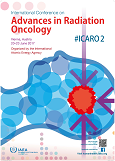Speaker
Rebecca Buecker
(Klinikum Lippe)
Description
INTRODUCTION: Radiotherapy is an essential cancer treatment which according to experts suggestions contributes to four in ten cases where cancer is cured.1 It is a relatively cheap, safe, 2 cost-effective treatment that is associated with high levels of patient satisfaction 3. Yet radiotherapy is still lacking in many African countries. Cameroon with a population of 22.3 million inhabitants has two radiotherapy units, however these services do not get the due attention they deserve compared to other cancer treatment modalities.
Considering the growing global burden of non-communicable diseases, particularly cancer, which has become a leading cause of mortality and disability in low- and middle-income countries, with more people across the world developing cancer than ever before, and with over two-thirds of all cancer-related deaths occurring in developing countries, there is an urgent need to get into action to fight for a better cancer health care in underserved areas.
METHOD: The first step was a comprehensive assessment of the necessity of Radiation Therapy at a selected hospital. The Mbingo Baptist Hospital (MBH) is a 300 bed hospital located in the North West province of Cameroon in Central Africa. Due to the broad spectrum of treatment modalities being offered at this hospital and the fact that patients come in from all over Cameroon, the hospital is being developed into a referral, teaching hospital. As concerns management of cancer, surgery is being offered. There is a pathology unit and also the possibility of receiving Chemotherapy on site. These and more make MBH one of the advanced centers in Cameroon where diagnosing cancer is possible and at least two treatment options can be administered. The hospital records show that close to 2000 patients have been diagnosed of cancer.
The most common cancer cases seen are breast, cervical, kaposi sarcoma and now due to a specialized training program in Head and Neck Surgery many of the patients treated in this program have some form of cancer. Unfortunately, Radiotherapy, being an inevitable treatment modality in the successful treatment of advanced stages of Head and Neck cancer and cervical cancer, does not exist at this hospital. To follow up with the establishment of a comprehensive cancer care program at MBH:
- Colleagues from the US and Germany in the field of Radiation Oncology (Doctors, Medical physicists and specialists in Radiation protection) first met to assess the need and feasibility of such a project on site.
- Get in contact with already existing facilities in Douala and Yaounde.
- Meet with the authorities of the hospital to address the need and importance of such an infrastructure. - Involve the Dean and staff of the medical school at the Capital for cooperation.
- Visit the National Radiation Protection Agency in Yaounde as concerns safety regulation standards.
-Make an estimate of the financial burden required to complete such a project, work on the project’s blueprint and set a deadline for project completion.
RESULTS: At the end of the journey, it was clear that MBH will not be able to carry the burden of such a project in totality. A roadmap created for establishing a comprehensive cancer center at Mbingo. Radiation oncology health professionals from Germany and the USA have committed to the project with plans to support in training of local staff. After brainstorming on different ways to assist the funding of the project, it was concluded that the diaspora and international partners get involved and making sure that MBH guarantees for a reliable stable source of power was outlined. It was also concluded that such a facility will need housing possibility also for the relatives of patients being treated at the center. To guarantee sustainability, long term strategies of collaboration via internet and Telemedicine with colleagues abroad would be mandatory.
CONCLUSION: The project is at its initial stage but the initiators and driving forces of it have the strong will to see it successful. To our knowledge, this is the first attempt for a mission hospital to come up with a radiation oncology project in Cameroon and we believe the success of this project will be a motivation for others to follow. For the success of this project, we rely on financial assistance from persons and organizations of goodwill.
| Institution | Radiation Oncology Department, klinikum-Lippe |
|---|---|
| Country | Germany |
Author
Rebecca Buecker
(Klinikum Lippe)
Co-authors
Arif Ali
Dennis Palmer
(Mbingo Baptist Hospital Cameroon)
Ernest Okonkwo
Linda Grossheim
Richard Samba
(National Radiation Protection Agency Yaounde Cameroon)
Wilfred Ngwa

